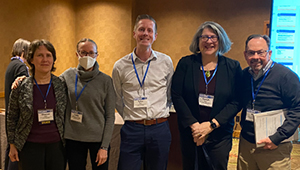Lorella Palazzo, PhD
Biography
Lorella Palazzo, PhD, is a sociologist who specializes in optimizing care delivery and improving access to health services. She has extensive experience in analyzing clinical data and evaluating health care improvement efforts. At Kaiser Permanente Washington Health Research Institute (KPWHRI), she has used this expertise to assess the progress and results of pilot projects supported by the Group Health Foundation Partnership for Innovation. In these projects, KPWHRI researchers and Kaiser Permanente Washington clinicians work together to test innovative health care improvement ideas. Dr. Palazzo's evaluations have determined how a pilot innovation affected health care costs, care delivery, and patient experiences. With the MacColl Center for Health Care Innovation, she also has evaluated efforts to reduce medical overuse. Dr. Palazzo has supported research at KPWHRI on aging and dementia, cancer, cardiovascular health, mental health, and safe medication use. She plans to continue and expand her recent work in implementation science and cancer screening. Inspired by her background as a sociologist, Dr. Palazzo is also interested in how social scientists can best collaborate with other health researchers to improve health care.
Dr. Palazzo’s previous work includes evaluating educational programs to make sure that nurses and medical assistants get up-to-date training that reflects current health care demands. She has studied the best ways to attract and retain nurses and other clinical personnel to underserved areas. She brings this experience to current research that particularly focuses on health disparities and matching the health workforce with the needs of rural residents and underrepresented minorities. Dr. Palazzo has also researched alternative modes of healing and how they are being integrated into health care delivery systems to expand care options for patients.
RESEARCH INTERESTS AND EXPERIENCE
-
Implementation science
Health information technologies; sustainability and diffusion of innovations; guideline implementation; organizational processes
-
Complementary & Integrative Health
Bringing evidence-based new approaches to clinical practice, exploring the sociocultural context for personal health tracking and behavior change
-
Cancer screening
Studying access to cancer screening; patient-, provider- and system-level determinants of screening; organization and outcomes of cancer screening services
-
Health Services & Economics
Assessing cost and effectiveness of quality improvement projects; using quantitative and qualitative methods to analyze delivery system innovations; optimizing the health care workforce
-
Evaluation Science
Using research methods to measure the effectiveness of health services and health professional training programs
-
Medical Sociology
Studying health care organizations and institutions; social factors in health, illness, and medical care; health care system access and health disparities
Recent publications
Head M, Cohn B, Wernli KJ, Palazzo L, Ehrlich K, Matson A, Knerr S. Young women's perspectives on being screened for hereditary breast and ovarian cancer risk during routine primary care. Womens Health Issues. 2024 Mar 5:S1049-3867(24)00004-5. doi: 10.1016/j.whi.2024.01.004. PubMed
Glass JE, Dorsey CN, Beatty T, Bobb JF, Wong ES, Palazzo L, King D, Mogk J, Stefanik-Guizlo K, Idu A, Key D, Fortney JC, Thomas R, McWethy AG, Caldeiro RM, Bradley KA. Study protocol for a factorial-randomized controlled trial evaluating the implementation, costs, effectiveness, and sustainment of digital therapeutics for substance use disorder in primary care (DIGITS Trial). Implement Sci. 2023 Feb 1;18(1):3. doi: 10.1186/s13012-022-01258-9. PubMed
Jones SMW, Sherman KJ, Bermet Z, Palazzo LG, Lewis CC. Theory of planned behavior and mindfulness intentions in chronic low back pain. Mindfulness (N Y). 2022 Nov 10:1-8. doi: 10.1007/s12671-022-02022-2. [Epub ahead of print]. PubMed
Palazzo L, Tuzzio L, Simon GE, Larson EB. A value proposition for pragmatic clinical trials. Am J Manag Care. 2022;28(9):e312-e314. doi: 10.37765/ajmc.2022.89224. PubMed
Parchman ML, Palazzo LG, Mogk JM, Webbon JC, Demosthenes L, Vossenkemper E, Hoke G, Moskovitz J, Dunlap L, Diaz del Carpio R. What strategies are used by clinician champions to reduce low-value care? SAGE Open Med. 2022 Jan 21;10:20503121211069855. doi: 10.1177/20503121211069855. eCollection 2022. PubMed
Research

Helping first-time screeners know when to return
Well-timed outreach in print and video can boost awareness of repeat screening for lung cancer, study finds.
HCSRN conference

Researchers present, connect at annual conference
The HCSRN conference is a venue for collaborative work to improve health and health care.
Free training

How to become a clinical value champion
KPWHRI’s ACT Center offers online training to help clinicians identify and curb overused services in clinical practice.

 Download photo
Download photo
